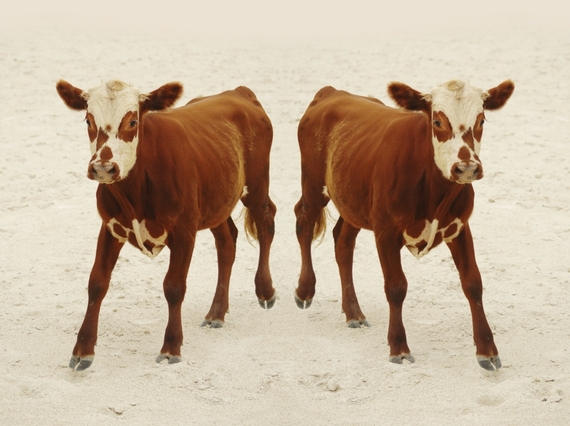A recent article in The Times advocates giving a “cautious green light” to gene editing of animals. It then quickly abandons its caution and talks of the “exciting possibilities” offered by this new technique.
Gene editing is a form of genetic engineering that involves changing, deleting or replacing some of an animal’s genetic material. Like other forms of hi-tech breeding such as cloning, gene editing generally aims to make animals more useful for us. It regards animals as machines that can be fine-tuned to produce even more meat or milk or to be better able to withstand the rigours of factory farming. I think we should say a firm ‘no’ to the use of gene editing in farming.
Traditional selective breeding has already led to massive health and welfare problems. Some dairy cows now produce 10,000 litres of milk a year – that’s ten times what they would produce naturally. The pressures on these cows are so great that many are utterly worn out after just three or four milk cycles and have to be prematurely slaughtered. The breeding of sows for large litters results in many piglets dying due to low birth rates.
Today’s meat chickens have been selected for such fast growth that their legs, hearts and lungs cannot properly support their rapidly growing bodies. The result: many suffer from painful leg disorders while others die of heart disease. Modern hens lay over 300 eggs a year. This robs their bones of calcium making them highly susceptible to bone fractures.
Gene editing animals to get them to produce even more milk or grow even faster is likely to heap still more suffering and ill-health onto our overworked farm animals.
Researchers are working to gene edit animals to make them resistant to disease. However, many diseases stem from keeping animals in overcrowded factory farms where they cannot engage in their natural behaviours. These stressful conditions undermine animals’ immune systems making them vulnerable to disease, while the overcrowding and large herd and flock sizes allow these diseases to spread like wildfire. We don’t need gene editing to prevent such diseases; we simply need to keep animals in good, healthy conditions.
Gene editing animals so that we can exploit them even further flies in the face of the growing recognition that animals are sentient beings and that each is an individual with their own distinct characteristics. Animals have been placed in this world for their own sakes, to live their own lives not just to act as our handmaids, as servants to our needs and wants. Gene editing takes a mechanistic view of animals as tools that can be made more efficient. This is unworthy of our finer, more generous instincts as humans. Let us recognise that animals are not pieces of machinery; they are our fellow creatures entitled, like us, to experience the joy of living.
— This feed and its contents are the property of The Huffington Post UK, and use is subject to our terms. It may be used for personal consumption, but may not be distributed on a website.
